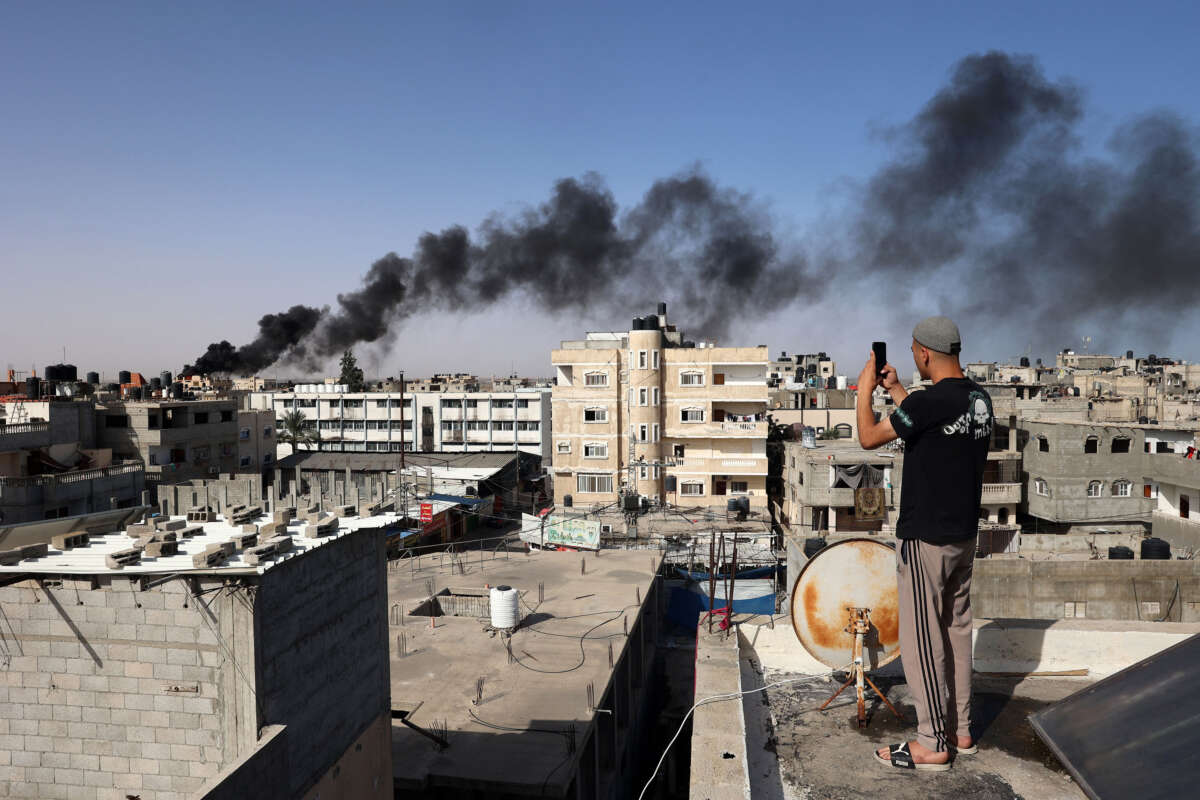Honest, paywall-free news is rare. Please support our boldly independent journalism with a donation of any size.
Members of the Israeli security cabinet voted to expand Israel’s brutal invasion of Rafah on Thursday, a report finds, amid warnings that a larger scale operation would escalate the genocide that is already characterized by atrocities unprecedented in modern times.
Axios reported on Friday that the officials approved an “expansion of the area of operation” of the Israel Defense Forces (IDF), according to three unnamed sources. They also called for the continuation of a hostage release and ceasefire deal, though Itamar Ben-Gvir and Bezalel Smotrich — two of the Israeli government’s most extremist leaders — voted against it, having called for a suspension of negotiations despite the release of hostages being on the line.
One of the sources said that the newly approved operations would make it so that the Rafah invasion, which the IDF began this week after months of shelling in the region, would cross the Biden administration’s “red line” of an invasion of Rafah. The other two sources said it wouldn’t.
In an interview this week, President Joe Biden said that his administration would withhold some 2,000 pound bombs — which are typically used for large-scale destruction — from weapons shipments to Israel if Israel invaded Rafah. In those comments, Biden claimed that Israeli forces hadn’t yet gone into Rafah, despite vast amounts of evidence that troops are on the ground in the southern city.
Earlier this week, U.S. officials said that Israel hadn’t yet crossed Biden’s red line with its invasion, even as Israeli forces have begun blocking all aid from entering through Gaza’s border crossings and have killed dozens of Palestinians in Rafah, including a 4-month-old baby.
A U.S. official has supposedly pushed back on the expansion of the invasion, but the administration has continued its unconditional support of Israel’s genocide in all other contexts so far.
“We are in a week with a significant decrease in the aid that is going in,” a U.S. official told Axios, downplaying the fact that no aid has entered Gaza for three days. “This is precisely the kind of thing we warned the Israelis against. It’s a microcosm of everything the Israelis have done for the past seven months, which is why we don’t trust them at all to do Rafah right.”
Even as the official expressed this supposed frustration, however, the U.S. voted against granting Palestine more access to the UN in a key UN General Assembly vote on Friday. The resolution, which passed 143 to 9, encourages the UN Security Council to consider Palestine’s request to join the UN as a member state.
The U.S. joined Israel in the minority of votes after having vetoed a Security Council resolution last month to block Palestine from becoming a full UN member.
The U.S.’s continued diplomatic support for Israel suggests that U.S. officials are not reneging on their support for the genocide even as Israeli troops imminently threaten the survival of every person in Gaza with their siege of Rafah. Israeli forces’ full aid blockade means no food or fuel is entering Gaza in a time of rapidly accelerating famine and disease.
Humanitarian groups and advocates for Palestinian rights have warned of catastrophe “beyond imagination” if Israel escalates its assault on Rafah even further, on top of already “unspeakable” conditions, as Sen. Bernie Sanders (I-Vermont) has noted.
“A massive ground attack in Rafah would lead to an epic humanitarian disaster,” said UN Secretary-General António Guterres. “The international community must speak with one voice for an immediate humanitarian ceasefire in Gaza, the immediate and unconditional release of all hostages, and a massive surge in life-saving aid.”
Press freedom is under attack
As Trump cracks down on political speech, independent media is increasingly necessary.
Truthout produces reporting you won’t see in the mainstream: journalism from the frontlines of global conflict, interviews with grassroots movement leaders, high-quality legal analysis and more.
Our work is possible thanks to reader support. Help Truthout catalyze change and social justice — make a tax-deductible monthly or one-time donation today.
